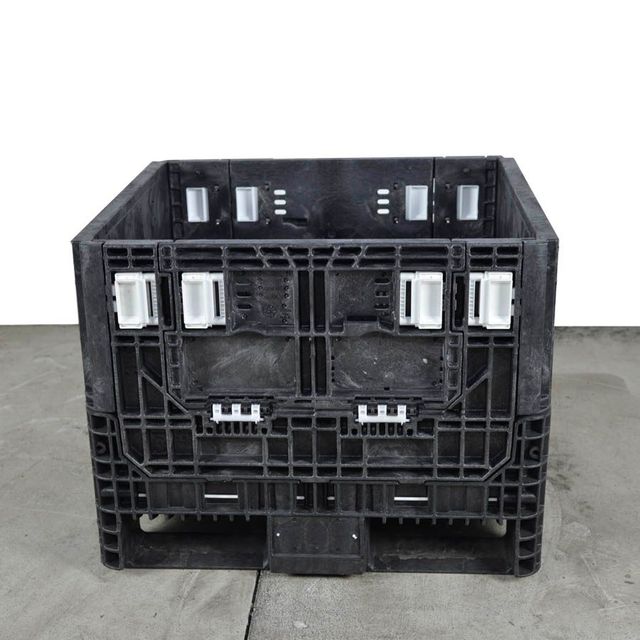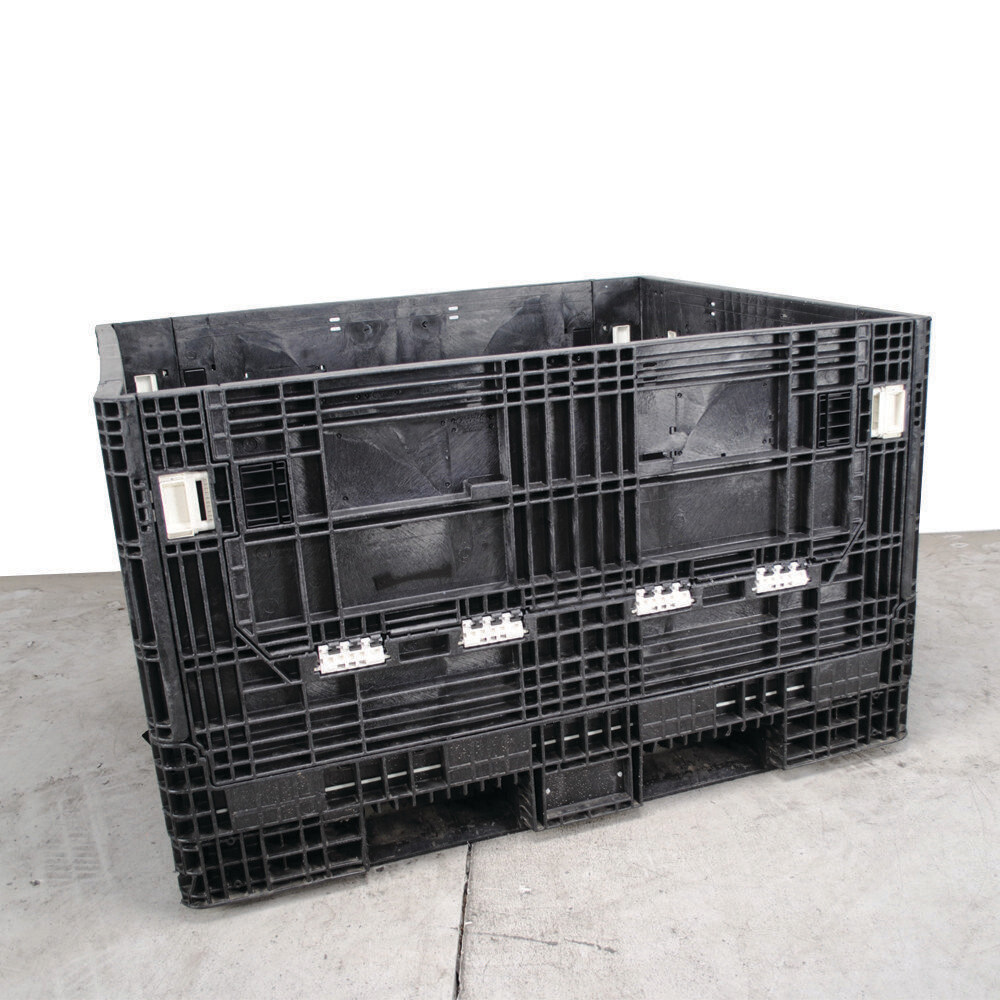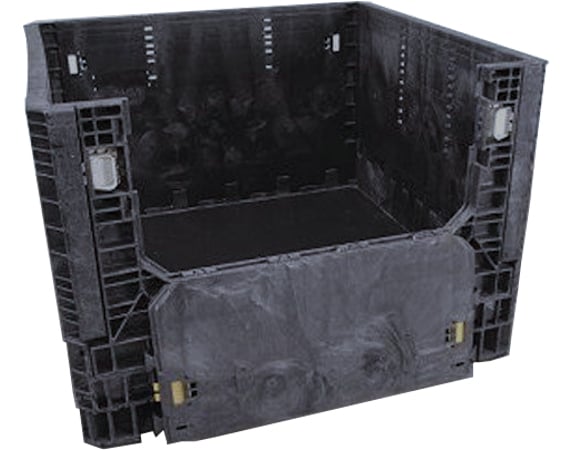Why refurbished bulk containers and used collapsible bulk containers are sustainable assets
Why Bulk Containers Are Important for Cost-efficient and sustainable Transportation
Bulk containers play an essential function in modern-day logistics. They help with the reliable motion of large amounts of products, thereby enhancing transport procedures. This approach not only decreases expenses but also decreases environmental impact through reduced exhausts and waste generation. As sectors look for even more lasting techniques, the adoption of bulk containers is ending up being significantly substantial. What effects does this change hold for future logistics and supply chain monitoring?

The Benefits of Making Use Of Mass Containers in Logistics
Bulk containers reinvent logistics by boosting efficiency and sustainability. These containers permit the transport of large quantities of goods in a single trip, substantially minimizing the variety of trips needed. This not only improves procedures however also reduces labor prices related to handling, filling, and dumping. Additionally, mass containers are made to maximize area usage within transport lorries, ensuring that even more items can be shipped at the same time.
The standardization of bulk containers additionally streamlines the logistics procedure. With consistent measurements, they can be quickly stacked and saved, bring about enhanced storehouse management. Furthermore, mass containers frequently include long lasting materials that secure components from damage throughout transit, thus lowering product loss and enhancing general dependability. Because of this, businesses can experience boosted supply chain efficiency, inevitably bring about boosted earnings and customer satisfaction. This combination of variables makes bulk containers a crucial asset in modern-day logistics.
Environmental Effect: Minimizing Waste and Carbon Footprint
As sectors progressively prioritize sustainability, the fostering of mass containers has become a crucial technique for lowering waste and reducing carbon impacts. These containers lessen the use of product packaging products, such as boxes and plastic, thereby significantly decreasing total waste generation. By combining deliveries, bulk containers boost transport efficiency, permitting more items to be transported per trip. This reduction in journeys straight correlates with reduced greenhouse gas discharges, contributing to a smaller sized carbon impact.
Additionally, bulk containers can frequently be recycled or recycled, additionally alleviating ecological influence. The toughness of these containers guarantees they can endure numerous transportation cycles, reducing the requirement for single-use choices. refurbished bulk containers. By improving logistics and advertising reliable source usage, bulk containers not only support lasting practices but additionally encourage industries to straighten with worldwide environmental goals. Inevitably, their application shows a commitment to environmental stewardship and accountable resource management
Cost Savings: How Bulk Containers Lower Transportation Expenses
While many companies look for methods to improve their lower line, the usage of bulk containers offers a substantial opportunity for lowering transportation expenses. Mass containers optimize the quantity of items transported, permitting organizations to deliver larger amounts at the same time. This efficiency reduces the variety of journeys needed, directly decreasing gas prices and minimizing labor expenditures related to loading and discharging.
Furthermore, bulk containers frequently feature streamlined designs that maximize area use within transport vehicles. This suggests less voids, causing more reliable use offered capacity. Additionally, the resilience of bulk containers can decrease the danger of product damages during transportation, minimizing losses and guaranteeing that more goods show up intact.
Enhancing Supply Chain Performance With Bulk Storage Space Solutions
Mass storage options play a vital duty in improving supply chain performance by maximizing stock monitoring. By combining items right into less, larger containers, services can greatly lower taking care of prices associated with frequent transfers and handling. This structured approach permits better tracking and administration of stock, inevitably resulting in enhanced functional efficiency.
Structured Supply Monitoring
Efficient supply monitoring is vital for enhancing supply chain operations, especially when organizations adopt bulk storage solutions. These remedies make it possible for businesses to preserve higher stock levels while reducing the regularity of replenishment. By consolidating materials into bulk containers, companies can enhance their stock processes, decreasing the intricacy connected with tracking numerous smaller sized packages. This method promotes precise supply matters and enhances projecting accuracy, permitting even more informed decision-making. In enhancement, bulk storage remedies simplify warehouse organization, making it easier to situate and accessibility products when required. Because of this, companies can accomplish a much more efficient supply turn over price, eventually improving general supply chain performance and minimizing the probability of stockouts or overstock circumstances.

Reduced Handling Expenses
The execution of bulk storage remedies not only simplifies inventory administration yet additionally considerably reduces managing prices across the supply chain. By combining products right into mass containers, companies lessen the demand for frequent handling and transfer between various storage and transport systems. This approach lowers labor prices related to loading, discharging, and moving smaller sized plans. Additionally, bulk storage decreases the regularity of shipments, bring about lower transportation costs and reduced gas intake. As a result, companies can enhance their logistics procedures, allowing for a more effective allocation of sources. Inevitably, reduced dealing with costs add to improved total supply chain effectiveness, promoting an environment that supports both sustainability and economic viability.

Convenience of Bulk Containers Across Numerous Industries
Lots of sectors have distinct requirements for transportation and storage space, mass containers have actually arised as a versatile solution that fulfills a vast variety of demands. These containers, varying from big containers to specialized storage tanks, can suit varied products, including granules, powders, and fluids. In the agricultural market, bulk containers help with the transport of grains and plant foods, while the food and beverage market utilizes them for active ingredients and ended up products. The chemical market depends on bulk containers for safely delivering hazardous materials, making sure conformity with safety and security laws. Additionally, building and construction companies take advantage of bulk containers for carrying aggregates and other materials. Their flexibility includes various settings of transport, consisting of ships, trucks, and trains, boosting logistical effectiveness. This flexibility not only improves operations throughout various markets but also promotes sustainability by reducing packaging waste and enhancing room en route. Consequently, bulk containers play a vital function in modern supply chain monitoring.
Future Fads wholesale Container Use and Sustainability
The future of bulk container use is progressively shaped by cutting-edge materials development that boosts sustainability. Furthermore, automation in logistics assures to enhance operations, lowering waste and enhancing performance. Accepting round economic climate methods will further reinvent how bulk containers are made, used, and reused, promoting an extra sustainable transport landscape.
Ingenious Materials Growth
As markets significantly prioritize sustainability, ingenious materials growth wholesale containers emerges as a substantial factor in news improving environment-friendly transport services. Suppliers and researchers are checking out eco-friendly plastics, recycled compounds, and lightweight metals to lower environmental effect. These products not just reduce waste however additionally enhance gas efficiency by reducing the general weight of containers. In addition, developments in wise products, which can adjust to differing conditions, improve the resilience and functionality of mass containers. The assimilation of these innovative materials lines up with circular economy concepts, promoting reuse and recycling. As the demand for lasting techniques grows, the development of such materials will play a vital role fit the future of bulk container usage in logistics and transportation.
Automation in Logistics
Significant advancements in automation are poised to transform logistics and the utilization of bulk containers, improving sustainability in transportation. Automated systems, including drones and autonomous cars, are enhancing the motion of bulk containers, minimizing the dependence on typical fuel-powered transportation. These innovations enhance routing and filling procedures, boosting and decreasing vacant miles gas effectiveness. Furthermore, automated inventory management official website systems enhance monitoring and tracking of bulk containers, making certain far better resource allotment and decreased waste. The integration of the Net of Points (IoT) enables real-time data evaluation, enabling proactive decision-making that lines up with sustainability goals. As automation proceeds to progress, it is expected to drive further innovations wholesale container usage, eventually supporting even more sustainable YOURURL.com logistics practices and decreasing the environmental effect of transport.
Circular Economic Situation Practices
Innovations in automation are establishing the stage for a much more incorporated technique to round economic climate methods in the domain name of mass container use. As sectors increasingly welcome sustainability, mass containers are being developed for durability and reusability. This change not just decreases waste but also enhances source efficiency. Business are adopting methods such as closed-loop systems, where used containers are accumulated, reconditioned, and reintroduced right into the supply chain. Furthermore, smart modern technologies track container life process, assisting in better administration and lowering ecological influence. The collaboration in between manufacturers, logistics providers, and end-users is essential in establishing criteria for lasting container use. refurbished bulk containers. Future patterns indicate a growing focus on materials that are recyclable and biodegradable, additional reinforcing the circular economic situation's concepts wholesale transportation

Regularly Asked Concerns
What Products Are Mass Containers Typically Made From?
Bulk containers are generally built from sturdy products such as high-density polyethylene, light weight aluminum, cardboard, and steel. These materials supply toughness, defense, and flexibility, making them appropriate for carrying numerous goods in various industries successfully.
Exactly how Do I Choose the Right Dimension Mass Container?
Choosing the appropriate size bulk container entails assessing the volume of products to be delivered, taking into consideration handling devices compatibility, and assessing storage room needs. Appropriate size guarantees efficiency in transportation and minimizes waste throughout shipment.
Are Bulk Containers Reusable or Recyclable?
Bulk containers are usually recyclable, developed for numerous trips, boosting sustainability. Lots of can likewise be reused, depending on the materials used. Selecting recyclable options additionally sustains ecological goals and decreases waste in transport techniques.
What Safety And Security Rules Apply to Bulk Container Transport?
Security policies for mass container transportation consist of compliance with the Division of Transport standards, correct labeling of hazardous materials, structural integrity analyses, and adherence to weight limitations to guarantee safe handling and prevent crashes throughout transit.
How Can Organizations Change to Using Bulk Containers Successfully?
Companies can change to bulk containers by assessing existing logistics, training team on handling, buying suitable devices, enhancing inventory administration, and working together with suppliers to guarantee compatibility and efficiency throughout the supply chain.
As industries progressively prioritize sustainability, the adoption of mass containers has actually arised as a key strategy for minimizing waste and reducing carbon impacts. By settling materials into mass containers, companies can improve their stock procedures, lowering the intricacy associated with tracking multiple smaller plans. As sectors progressively prioritize sustainability, ingenious products development in mass containers emerges as a substantial element in improving green transport options. Automated systems, including drones and independent vehicles, are enhancing the movement of mass containers, decreasing the reliance on standard fuel-powered transportation. Additionally, automated stock administration systems enhance tracking and tracking of mass containers, making sure much better resource appropriation and decreased waste.